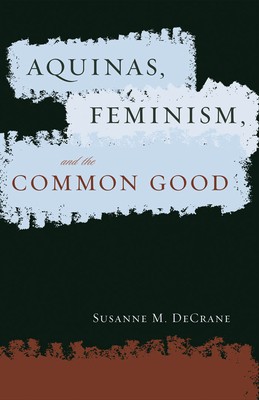
- We will send in 10–14 business days.
- Author: Susanne M Decrane
- Publisher: Georgetown University Press
- ISBN-10: 0878403493
- ISBN-13: 9780878403493
- Format: 13.9 x 21.4 x 1.9 cm, softcover
- Language: English
- SAVE -10% with code: EXTRA
Reviews
Description
What can feminist scholars of religion and ethics do with the imposing figure of Thomas Aquinas, whose views of women can be only be described as misogynistic? Rather than dispense with him altogether, DeCrane seeks to take one of Thomas's great intellectual contributions to religious thought, the fundamental notion of the common good--in short, peace and justice--and use that as a lens through which to view a contemporary social issue: women's health care in the United States and, specifically, black women and breast cancer. In retrieving Thomas's principle of the common good, DeCrane hopes to show that certain aspects of religious traditions heretofore understood as oppressive to women and minority groups can actually be invoked to help rectify social ills. In making her claims DeCrane offers a helpful summary of three contemporary feminist authors--Sandra Schneiders (scripture interpretation), Rosemary Radford Ruether (theology), and Martha Nussbaum (philosophy)--as she builds a feminist method for retrieving texts. The strength of her work lies in making a case for this process of retrieval, and not so much in arguing against the injustices of the U.S. health care system. Still, this is a bold attempt by a feminist Catholic scholar who seeks to remain within the tradition--while demanding that the tradition live up to its emphasis on justice.
EXTRA 10 % discount with code: EXTRA
The promotion ends in 18d.21:23:55
The discount code is valid when purchasing from 10 €. Discounts do not stack.
- Author: Susanne M Decrane
- Publisher: Georgetown University Press
- ISBN-10: 0878403493
- ISBN-13: 9780878403493
- Format: 13.9 x 21.4 x 1.9 cm, softcover
- Language: English English
What can feminist scholars of religion and ethics do with the imposing figure of Thomas Aquinas, whose views of women can be only be described as misogynistic? Rather than dispense with him altogether, DeCrane seeks to take one of Thomas's great intellectual contributions to religious thought, the fundamental notion of the common good--in short, peace and justice--and use that as a lens through which to view a contemporary social issue: women's health care in the United States and, specifically, black women and breast cancer. In retrieving Thomas's principle of the common good, DeCrane hopes to show that certain aspects of religious traditions heretofore understood as oppressive to women and minority groups can actually be invoked to help rectify social ills. In making her claims DeCrane offers a helpful summary of three contemporary feminist authors--Sandra Schneiders (scripture interpretation), Rosemary Radford Ruether (theology), and Martha Nussbaum (philosophy)--as she builds a feminist method for retrieving texts. The strength of her work lies in making a case for this process of retrieval, and not so much in arguing against the injustices of the U.S. health care system. Still, this is a bold attempt by a feminist Catholic scholar who seeks to remain within the tradition--while demanding that the tradition live up to its emphasis on justice.


Reviews